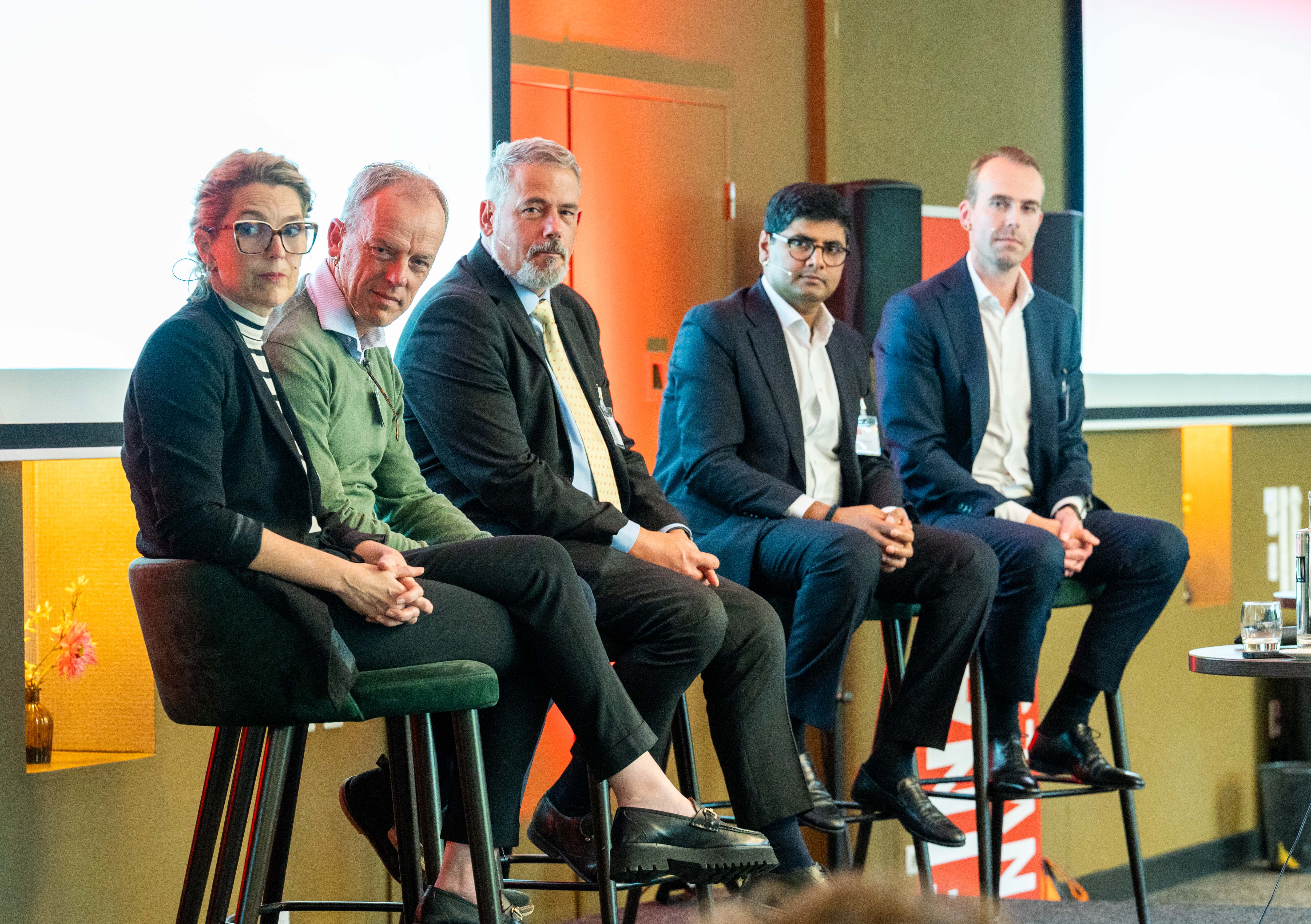Q&A session: Implementing Private Markets
Q&A session: Implementing Private Markets

This report was originally written in Dutch. This is an English translation.
During the seminar on private markets organised by Financial Investigator, experts discussed why pension funds and investors cannot ignore private equity and growth equity if they want to invest in the economy of the future.
By Hans Amesz
|
MODERATOR Hans de Ruiter, TNO Pension Fund, PMT, Achmea Pension Fund, Nyenrode Business University Erik Jan van Bergen, Coöperatie VGZ Marieke van Kamp, NN Group Erik Leseman, Independent investment consultant Koen Ronda, IBS Capital Allies Niranjan Sirdeshpande, M&G Investments |
Why should investors focus on growth equity?
Niranjan Sirdeshpande: 'Growth equity is somewhere between private equity and venture capital. It involves companies that have found a product-market fit. They have taken an idea developed in a laboratory or other scientific environment and turned it into a commercial venture. These companies want to attract new customers in order to operate globally and acquire smaller companies to strengthen their growth. And they are important because they are likely to grow by around 20% over the next ten to fifteen years. These are the companies of the future that have not yet gone public.
A large part of the growth will therefore take place via the private markets. These companies will need more and more capital. They do not carry the same risks as venture capital, where the outcome is almost always binary: the company succeeds or it fails.
Here, the company has proven that it has a solution or product that is valuable on the commercial market. That is why I believe that growth equity is an important part of any portfolio, and that a strong foundation can be laid in broader private equity allocations by adding this segment. Companies are looking for European investors, but for the most part they will not find them.
Many of the financing rounds will be led by American investors, who dictate the terms. If a company is successful, there is a good chance that it will end up in the United States and we will never reap the benefits of any earlier European investment efforts. That is unfortunate and has not only financial but also social consequences. But it is not too late. There are opportunities to really invest in the next wave of technological development, and Europe is well positioned for this, as is the Netherlands. Excellent research is being done, especially in the field of semiconductors and their application, and in the field of photonics. The research being done in the field of agriculture and food systems is related to climate change. Companies focusing on this will be set up in Europe. They will need financing. Let's make sure that we, as a sector, work together on all of this.'
The biggest growth in the private equity sector comes from secondaries. What does that mean?
Koen Ronda: 'We launch a new fund to invest in private equity once every one to two years: the first fund is primary PE, the second is secondary PE. Within secondary investments, we have a strong preference for GP-led deals. We have already done a few secondary transactions in the past and are also working on direct secondary transactions. I always thought you needed a large network for the secondary market, but nowadays placing agents also do a lot of the work. The primary GP goes to a placing agent, who calls everyone he knows. As long as you can write tickets that are large enough and you can do your homework fairly quickly, it is not that difficult to move to the secondary market.
As soon as we have the money, we start investing it immediately. Co-investments usually start to increase more quickly, as you don't pay any fees on them. The fact that we can offer our clients co-investments is attractive to them. We also have many private equity managers with their private assets in our client base, which is a sign of approval for us. They are also enthusiastic about secondaries, as am I, but you have to be careful and do the necessary homework.'
Marieke van Kamp: 'We have also done a number of secondary transactions. When we did the due diligence for a new fund that was to be added, there were a number of secondary transactions available. We bought those to fill the book a little more. But to be honest, that was difficult. It took a lot of internal lobbying and discussion to be able to accept the shares as they were, because we couldn't renegotiate them.'
Ronda: 'The biggest risk of co-investments is concentration risk. You need to be able to build a diversified portfolio.'
The biggest risk of co-investments is concentration risk. You need to be able to build a diversified portfolio.
What lessons have you learned? What keeps you awake at night? What is your biggest nightmare?
Erik Jan van Bergen: 'A lot of internal communication is needed. It is important to ensure that your internal organisation understands and continues to understand the challenges of venture capital.'
A lot of internal communication is needed. It is important to ensure that your internal organisation understands and continues to understand the challenges of venture capital.
Erik Leseman: 'My biggest nightmare is that we don't take advantage of all the opportunities that private markets offer us. That internal constraints prevent investments from being made or cause them to be delayed significantly. In line with what Erik Jan says, a lot of communication is needed, and it is advisable to involve related functions early in the investment process.'
Ronda: 'Evergreens are the next big threat to the reputation of private markets. The advantages – semi-liquidity or the rapid deployment of capital – are offset by enormous disadvantages: cash drag, the closure of the fund when everyone wants liquidity, the pressure to keep the money working. I am concerned that certain large parties are pumping so much money into this, and that clients are being promised returns based on closed-end funds that will not be realised in evergreen structures. Ultimately, the sector will be blamed for this. That is what I fear.'
What is the role of pension funds?
Sirdeshpande: 'Today, there are 50% fewer investable companies on the public markets in the United States. A lot of value is being created on private markets. If a pension fund today is only active in public markets and not in private markets, it is in fact participating in an economy of the past and not in the economy of the future, and it will not create any value for the next fifteen years or so. Pension funds are therefore ideally suited to investing in private markets. If they do not participate in the economy of the future, they are failing their participants in terms of value creation. This will cause enormous social problems. This is about building a future that is suitable for our children to live in.'
Ronda: 'I think this is a good story, one that is not often told. Pension funds are also very busy with current regulations and could focus more on the future, but that may be a problem everywhere. There are many regulations and a lot of money, and the question is: how do you best deal with that?'
Van Bergen: 'Most pension funds are cautious these days. But things can change. For example, if you had talked about pension funds investing in Dutch mortgages ten years ago, you would have been looked at with a bit of pity. Today, the opposite is true. Investing in private equity and, more specifically, in venture capital is very important for the long-term dynamics of the European economy and society. Now we are in danger of falling behind other blocs. Pension fund members and their children and grandchildren will benefit from a trend in which more Dutch pension funds follow the example of the “early adopters” and include this category of impactful investments in their investment mix.'
|
SUMMARY Growth equity offers stable growth and lower risks than venture capital. Europe must invest in technological innovations in order not to fall behind the US. Secondaries are growing rapidly, but require careful risk management and diversification. Evergreens can cause reputational damage due to overly optimistic return expectations. Pension funds that do not invest in private markets are missing out on the economy of the future and thus harming their participants in the long term. |










